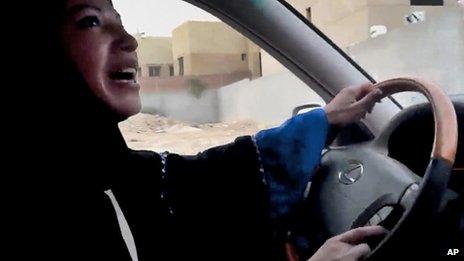Saudi cleric says driving risks damaging women's ovaries
- Published

Thousands have signed up to a campaign to defy the ban
Women who drive risk damaging their ovaries and producing children with clinical problems, according to a conservative Saudi cleric.
The comment, made by Sheikh Saleh al-Lohaidan, came as activists step up their campaign for women in Saudi Arabia to be allowed to drive.
Women are being called upon to defy the ban and drive on 26 October.
The campaign, started on Twitter, external, has attracted more than 11,000 signatures.
It is the latest in a series of campaigns over the past two decades for women to be allowed to sit behind the wheel.
The ban on women drivers, while informal, is enforced by Saudi police through fines and arrests. Only men are permitted to acquire driving licences.
"If a woman drives a car, not out of pure necessity, that could have negative physiological impacts as functional and physiological medical studies show that it automatically affects the ovaries and pushes the pelvis upwards," Sheikh Lohaidan told the news website Sabq.org.
"That is why we find those who regularly drive have children with clinical problems of varying degrees."
Sheikh Lohaidan is reported to be opposed to reform more generally and granting women more rights in the kingdom.
Opponents of giving women the right to drive in Saudi Arabia say it offends the country's traditional code.
But those behind the campaign for the ban to be lifted point to inconsistencies, such as the need for women to employ a male driver who is not a family member.
- Published9 July 2013
- Published17 June 2011
- Published27 September 2011